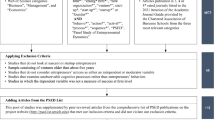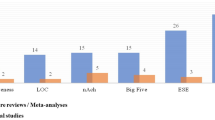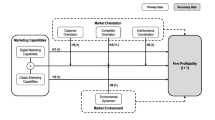Abstract
The DUI (learning by doing-using-interacting) mode offers a promising theoretical framework to explain why many small- and medium-sized enterprises (SMEs) are successful in innovation without research and development (R&D) efforts. In this context, we argue that—because of the informal, person-centered, and interactive nature of the DUI mode—small business owners should be in a key position to trigger DUI learning processes at the company level. Based on a large SME data set from Germany, we show empirically that Big Five personality traits of small business owners positively affect self-selection into DUI-based innovation in less R&D-intensive SMEs. That is, companies operating largely under the DUI mode seem to benefit in particular from certain owners’ personality characteristics. In addition, we present novel evidence that complementarities between different Big Five traits exist in terms of self-selection into the DUI mode, thereby pointing to the role of personality prototypes. The paper concludes with implications for policy and further research.
Plain English Summary
Solving the SME innovation puzzle—resilient owner personalities boost small firm innovativeness. This psychological effect only exists in non-R&D SMEs, providing a new explanation for their surprising innovation success. SME owners are involved in most day-to-day activities of their company. An owner’s personality therefore directly affects external and internal communication flows, laying the foundation for a company’s innovation culture. We show that a resilient personality type—an owner who is characterized by emotional stability, openness, extraversion, and conscientiousness—benefits innovation in non-R&D SMEs. According to our analysis, resilient owners are about 5.5% more likely to trigger an innovation mode within their company that builds on non-R&D-based knowledge, communication, and interaction. Our research implies that entrepreneurship education and consultancy should foster psychological self-awareness, and thereby increase an owner’s understanding of his/her most effective role in terms of firm-level innovation. Successful entrepreneurship and innovation is not fully determined by one’s personality type, but knowing one’s own strength and weaknesses can help to carve out an effective niche, defining the scope of one’s responsibility, as well as its limits.

Similar content being viewed by others
Code availability
The Stata do-file used for the empirical analysis is available in the Mendeley Data repository, V1, https://data.mendeley.com/datasets/nphgrvyf39/1.
Data availability
The dataset analyzed during the current study and a description of variables are available in the Mendeley Data repository, V1, https://data.mendeley.com/datasets/nphgrvyf39/1.
Notes
Defined according to the SME definition set by the European Union (i.e., an upper threshold of 249 employees).
We did not perform this two-step procedure in the case of innovation sources. Hierarchical clustering without additional k-means achieved more distinct groups with respect to the R&D variable. As the varying importance of in-house R&D lies at the heart of the STI/DUI concept, we refrained from non-hierarchical clustering there.
References
Acs, Z. J., & Audretsch, D. B. (2005). Innovation and technological change. In: Acs, Z. J., & Audretsch, D. B. (Eds), Handbook of entrepreneurship research. An interdisciplinary survey and introduction (pp. 55–79). Springer.
Ahn, J. M., Minshall, T., & Mortara, L. (2017). Understanding the human side of openness: The fit between open innovation modes and CEO characteristics. R&D Management, 47(5), 727–740. https://doi.org/10.1111/radm.12264.
Alhusen, H., & Bennat, T. (2020). Combinatorial innovation modes in SMEs: Mechanisms integrating STI processes into DUI mode learning and the role of regional innovation policy. European Planning Studies. https://doi.org/10.1080/09654313.2020.1786009.
Andries, P., & Czarnitzki, D. (2014). Small firm innovation performance and employee involvement. Small Business Economics, 43(1), 21–38. https://doi.org/10.1007/s11187-014-9577-1.
Ang, J. S., Cole, R. A., & Lin, J. W. (2000). Agency costs and ownership structure. The Journal of Finance, 55(1), 81–106. https://doi.org/10.1111/0022-1082.00201.
Apanasovich, N. (2016). Modes of innovation: A grounded meta-analysis. Journal of the Knowledge Economy, 7(3), 720–737. https://doi.org/10.1007/s13132-014-0237-0.
Apanasovich, N., Alcalde Heras, H., & Parrilli, M. D. (2016). The impact of business innovation modes on SME innovation performance in post-Soviet transition economies: The case of Belarus. Technovation, 57–58, 30–40. https://doi.org/10.1016/j.technovation.2016.05.001.
Asendorpf, J. B. (2002). Editorial: The puzzle of personality types. European Journal of Personality, 16(S1), S1–S5. https://doi.org/10.1002/per.446.
Asendorpf, J. B., Borkenau, P., Ostendorf, F., & van Aken, M. A. G. (2001). Carving personality description at its joints: Confirmation of three replicable personality prototypes for both children and adults. European Journal of Personality, 15(3), 169–198. https://doi.org/10.1002/per.408.
Asheim, B. T., & Parrilli, M. D. (2012). Introduction: Learning and interaction — drivers for innovation in current competitive markets. In: Asheim, B.T., Parrilli, M.D. (Eds.), Interactive learning for innovation. A key driver within clusters and innovation systems (pp. 1–29). Palgrave London https://doi.org/10.1057/9780230362420_1.
Audretsch, D. B., Kritikos, A. S., & Schiersch, A. (2020). Microfirms and innovation in the service sector. Small Business Economics, 55(4), 997–1018. https://doi.org/10.1007/s11187-020-00366-4.
Baldwin, J., & Gellatly, G. (2003). Innovation strategies and performance in small firms. Edward Elgar.
Bernoster, I., Mukerjee, J., & Thurik, R. (2020). The role of affect in entrepreneurial orientation. Small Business Economics, 54(1), 235–256. https://doi.org/10.1007/s11187-018-0116-3.
Billett S. (2012) Explaining innovation at work: A socio-personal account. In: Høyrup S., Bonnafous-Boucher M., Hasse C., Lotz M., Møller K. (Eds.), Employee-driven innovation (pp. 92–107). Palgrave Macmillan https://doi.org/10.1057/9781137014764_5.
Boehm, B., Asendorpf, J. B., & Avia, M. D. (2002). Replicable types and subtypes of personality: Spanish NEO-PI samples. European Journal of Personality, 16(S1), S25–S41. https://doi.org/10.1002/per.450.
Bolton, D. L., & Lane, M. D. (2012). Individual entrepreneurial orientation: Development of a measurement instrument. Education + Training, Vol. 54 No. 2/3, 219–233, https://doi.org/10.1108/00400911211210314.
Boyle, G. J. (2008). Critique of five-factor model (FFM). Personality theories and modelsIn G. J. Boyle, G. Matthews, & D. H. Saklofske (Eds.), The SAGE handbook of personality theory and assessment (Vol. 1, pp. 295–312). SAGE.
Caliendo, M., Fossen, F., & Kritikos, A. S. (2014). Personality characteristics and the decisions to become and stay self-employed. Small Business Economics, 42(4), 787–814. https://doi.org/10.1007/s11187-013-9514-8.
Ciavarella, M. A., Buchholtz, A. K., Riordan, C. M., Gatewood, R. D., & Stokes, G. S. (2004). The Big Five and venture survival: Is there a linkage? Journal of Business Venturing, 19(4), 465–483. https://doi.org/10.1016/j.jbusvent.2003.03.001.
Cobb-Clark, D. A., & Schurer, S. (2012). The stability of Big-Five personality traits. Economics Letters, 115(1), 11–15. https://doi.org/10.1016/j.econlet.2011.11.015.
Cohen, W. (1995). Empirical studies of innovative activity. In P. Stoneman (Ed.), Handbook of the economics of innovation and technological change (pp. 182–264). Blackwell.
Cohen, W., & Levinthal, D. A. (1989). Innovation and learning: The two faces of R&D. Economic Journal, 99(397), 569–596. https://doi.org/10.2307/2233763.
Cohen, W., & Levinthal, D. A. (1990). Absorptive capacity: A new perspective on learning and innovation. Administrative Science Quarterly, 35(1), 128–152. https://doi.org/10.2307/2393553.
Costa, P. T., & McCrae, R. R. (1995). Domains and facets: Hierarchical personality assessment using the Revised NEO Personality Inventory. Journal of Personality Assessment, 64(1), 21–50. https://doi.org/10.1207/s15327752jpa6401_2.
Covin, J. G., & Wales, W. J. (2012). The measurement of entrepreneurial orientation. Entrepreneurship Theory and Practice, 36(4), 677–702. https://doi.org/10.1111/j.1540-6520.2010.00432.x.
de Fruyt, F., Mervielde, I., & van Leeuwen, K. (2002). The consistency of personality type classification across samples and five-factor measures. European Journal of Personality, 16(S1), S57–S72. https://doi.org/10.1002/per.444.
de Jong, J., & Marsili, O. (2006). The fruit flies of innovations: A taxonomy of innovative small firms. Research Policy, 35(2), 213–229. https://doi.org/10.1016/j.respol.2005.09.007.
Digman, J. M. (1990). Personality structure: Emergence of the five-factor model. Annual Review of Psychology, 41, 417–440. https://doi.org/10.1146/annurev.ps.41.020190.002221.
Fitjar, R. D., & Rodríguez-Pose, A. (2013). Firm collaboration and modes of innovation in Norway. Research Policy, 42(1), 128–138. https://doi.org/10.1016/j.respol.2012.05.009.
Furnham, A. (2008). Relationship among four Big Five measures of different length. Psychological Reports, 102(1), 312–316. https://doi.org/10.2466/pr0.102.1.312-316.
Gerlach, M., Farb, B., Revelle, W., & Amaral, L. A. N. (2018). A robust data-driven approach identifies four personality types across four large data sets. Nature Human Behaviour, 2(10), 735–742. https://doi.org/10.1038/s41562-018-0419-z.
Gosling, S. D., Rentfrow, P. J., & Swann, W. B., Jr. (2003). A very brief measure of the Big-Five personality domains. Journal of Research in Personality, 37(6), 504–528. https://doi.org/10.1016/S0092-6566(03)00046-1.
Greene, W. H. (2012). Econometric analysis, 71e. Stern School of Business.
Hair, J. F., Anderson, R. E., Tatham, R. L., & Black, W. C. (1998). Multivariate data analysis (5th ed.). Prentice-Hall International, Inc.
Hall, B. H., Lotti, F., & Mairesse, J. (2009). Innovation and productivity in SMEs: Empirical evidence for Italy. Small Business Economics, 33(1), 13–33. https://doi.org/10.1007/s11187-009-9184-8.
Haus-Reve, S., Fitjar, R. D., & Rodríguez-Pose, A. (2019). Does combining different types of collaboration always benefit firms? Collaboration, complementarity and product innovation in Norway. Research Policy, 48(6), 1476–1486. https://doi.org/10.1016/j.respol.2019.02.008.
Hervas-Oliver, J.-L., Albors Garrigos, J., & Gil-Pechuan, I. (2011). Making sense of innovation by R&D and non-R&D innovators in low technology contexts: A forgotten lesson for policymakers. Technovation, 31(9), 427–446. https://doi.org/10.1016/j.technovation.2011.06.006.
Hervas-Oliver, J.-L., Boronat-Moll, C., & Sempere-Ripoll, F. (2016). Does management innovation pay-off in SMEs? Empirical evidence for Spanish SMEs. Small Business Economics, 47(2), 507–533. https://doi.org/10.1007/s11187-016-9733-x.
Hervas-Oliver, J.-L., Sempere-Ripoll, F., & Boronat-Moll, C. (2014). Process innovation strategy in SMEs, organizational innovation and performance: A misleading debate? Small Business Economics, 43(4), 873–886. https://doi.org/10.1007/s11187-014-9567-3.
Herzberg, P. Y., & Roth, M. (2006). Beyond resilients, undercontrollers, and overcontrollers? An extension of personality prototype research. European Journal of Personality, 20(1), 5–28. https://doi.org/10.1002/per.557.
Hewitt-Dundas, N. (2006). Resource and capability constraints to innovation in small and large plants. Small Business Economics, 26(3), 257–277. https://doi.org/10.1007/s11187-005-2140-3.
Hofstee, W. K. B. (2002). Types and variables: towards a congenial procedure for handling personality data. European Journal of Personality, 16(S1), S89–S96. https://doi.org/10.1002/per.447.
Horn, J. L. (1965). A rationale and test for the number of factors in factor analysis. Psychometrika, 30(2), 179–185. https://doi.org/10.1007/BF02289447.
Humphreys, L. G., & Montanelli, R. G., Jr. (1975). An investigation of the parallel analysis criteria on for determining the number of common factors. Multivariate Behavioral Research, 10(2), 193–205. https://doi.org/10.1207/s15327906mbr1002_5.
Jensen, M. B., Johnson, B., Lorenz, E., & Lundvall, B. Å. (2007). Forms of knowledge and modes of innovation. Research Policy, 36(5), 680–693. https://doi.org/10.1016/j.respol.2007.01.006.
John, O. P., Donahue, E. M., & Kentle, R. L. (1991). The Big Five Inventory-Versions 4a and 54. University of California, Berkeley, Institute of Personality and Social Research.
John, O. P., Naumann, L. P., & Soto, C. J. (2008). Paradigm shift to the integrative Big Five trait taxonomy: History, measurement, and conceptual issues. In: John, O. P., Robins R. W. & Pervin, L. A. (Eds.), Handbook of personality: Theory and research (p. 114–158). The Guilford Press.
John, O. P., & Srivastava, S. (1999). The Big-Five trait taxonomy: History, measurement, andtheoretical perspectives. In L. A. Pervin & O. P. John (Eds.), Handbook of personality: Theory and research (Vol. 2, pp. 102–138). Guilford Press.
Kirner, E., Som, O., & Jäger, A. (2015). Innovation strategies and patterns of non-R&D-performing and non-R&D-intensive firms. In: Som O., Kirner E. (Eds.), Low-tech innovation (pp. 91–111). Springer International Publishing https://doi.org/10.1007/978-3-319-09973-6_7.
Lane, P. J., Koka, B. R., & Pathak, S. (2006). The reification of absorptive capacity: A critical review and rejuvenation of the construct. Academy of Management Review, 31(4), 833–863. https://doi.org/10.5465/amr.2006.22527456.
Marcati, A., Guidoa, G., & Peluso, A. M. (2008). The role of SME entrepreneurs’ innovativeness and personality in the adoption of innovations. Research Policy, 37(9), 1579–1590. https://doi.org/10.1016/j.respol.2008.06.004.
McAdam, R., Moffett, S., Hazlett, S. A., & Shevlin, M. (2010). Developing a model of innovation implementation for UK SMEs: A path analysis and explanatory case analysis. International Small Business Journal, 28(3), 195–214. https://doi.org/10.1177/0266242609360610.
McCrae, R. R., & Costa, P. T., Jr. (2008). The five-factor theory of personality. In O. P. John, R. W. Robins, & L. A. Pervin (Eds.), Handbook of personality: Theory and research (pp. 159–181). Guilford Press.
McGuirk, H., Lenihan, H., & Hart, M. (2015). Measuring the impact of innovative human capital on small firms’ propensity to innovate. Research Policy, 44(4), 965–976. https://doi.org/10.1016/j.respol.2014.11.008.
Meeus, W., Van de Schoot, R., Klimstra, T., & Branje, S. (2011). Personality types in adolescence: Change and stability and links with adjustment and relationships: A five-wave longitudinal study. Developmental Psychology, 47(4), 1181–1195. https://doi.org/10.1037/a0023816.
Miller, D. (1983). The correlates of entrepreneurship in three types of firms. Management Science, 29(7), 770–791. https://doi.org/10.1287/mnsc.29.7.770.
Millward, H., & Lewis, A. (2005). Barriers to successful new product development within small manufacturing companies. Journal of Small Business and Enterprise Development, 12(3), 379–394. https://doi.org/10.1108/14626000510612295.
Moilanen, M., Østbye, S., & Woll, K. (2014). Non-R&D SMEs: External knowledge, absorptive capacity and product innovation. Small Business Economics, 43(2), 447–462. https://doi.org/10.1007/s11187-014-9545-9.
Nooteboom, B. (1994). Innovation and diffusion in small firms: Theory and evidence. Small Business Economics, 6(5), 327–347. https://doi.org/10.1007/BF01065137.
Nunes, S., & Lopes, R. (2015). Firm performance, innovation modes and territorial embeddedness. European Planning Studies, 23(9), 1796–1826.
Obschonka, M., & Stuetzer, M. (2017). Integrating psychological approaches to entrepreneurship: the Entrepreneurial Personality System (EPS). Small Business Economics, 49(1), 203–231. https://doi.org/10.1007/s11187-016-9821-y.
OECD/Eurostat. (2018). Oslo manual: Guidelines for collecting, reporting and using data on innovation (4th ed.). In The measurement of scientific, technological and innovation activities. OECD Publishing/Eurostat. https://doi.org/10.1787/9789264304604-en.
Ortega-Argilés, R., Vivarelli, M., & Voigt, P. (2009). R&D in SMEs: A paradox? Small Business Economics, 33(1), 3–11. https://doi.org/10.1007/s11187-009-9187-5.
Parrilli, M. D., & Alcalde Heras, H. (2016). STI and DUI innovation modes: Scientific-technological and context-specific nuances. Research Policy, 45(4), 747–756. https://doi.org/10.1016/j.respol.2016.01.001.
Parrilli, M. D., & Elola, A. (2012). The strength of science and technology drivers for SME innovation. Small Business Economics, 39(4), 897–907. https://doi.org/10.1007/s11187-011-9319-6.
Parrilli, M. D., & Radicic, D. (2020). STI and DUI innovation modes in micro-, small-, medium- and large-sized firms: Distinctive patterns across Europe and the U.S.. European Planning Studies, https://doi.org/10.1080/09654313.2020.1754343.
Paton, R. A., & McLaughlin, S. (2008). Services innovation: Knowledge transfer and the supply chain. European Management Journal, 26(2), 77–83. https://doi.org/10.1016/j.emj.2008.01.004.
Podsakoff, P. M., MacKenzie, S. B., Lee, J.-L., & Podsakoff, N. P. (2003). Common method biases in behavioral research: A critical review of the literature and recommended remedies. Journal of Applied Psychology, 88(5), 879–903. https://doi.org/10.1037/0021-9010.88.5.879.
Rammer, C., Czarnitzki, D., & Spielkamp, A. (2009). Innovation success of non-R&D-performers: Substituting technology by management in SMEs. Small Business Economics, 33(1), 35–58. https://doi.org/10.1007/s11187-009-9185-7.
Rammstedt, B., & John, O. P. (2007). Measuring personality in one minute or less: A 10-item short version of the Big Five Inventory in English and German. Journal of Research in Personality, 41(1), 203–212. https://doi.org/10.1016/j.jrp.2006.02.001.
Rantanen, J., Metsäpelto, R. L., Feldt, T., Pulkkinen, L. E. A., & Kokko, K. (2007). Long-term stability in the Big Five personality traits in adulthood. Scandinavian Journal of Psychology, 48(6), 511–518. https://doi.org/10.1111/j.1467-9450.2007.00609.x.
Robins, R. W., John, O. P., Caspi, A., Moffitt, T. E., & Stouthamer-Loeber, M. (1996). Resilient, overcontrolled, and undercontrolled boys: Three replicable personality types. Journal of Personality and Social Psychology, 70(1), 157–171. https://doi.org/10.1037/0022-3514.70.1.157.
Rogers, M. (2004). Networks, firm size and innovation. Small Business Economics, 22(2), 141–153. https://doi.org/10.1023/B:SBEJ.0000014451.99047.69.
Rothwell, R. (1989). Small firms, innovation and industrial change. Small Business Economics, 1(1), 51–64. https://doi.org/10.1007/BF00389916.
Schmidt, T. (2010). Absorptive capacity - One size fits all? A firm-level analysis of absorptive capacity for different kinds of knowledge. Managerial and Decision Economics, 31, 1–18. https://doi.org/10.1002/mde.1423.
Schnabel, K., Asendorpf, J. B., & Ostendorf, F. (2002). Replicable types and subtypes of personality: German NEO-PI-R versus NEO-FFI. European Journal of Personality, 16(S1), S7–S24. https://doi.org/10.1002/per.445.
Specht, J., Luhmann, M., & Geiser, C. (2014). On the consistency of personality types across adulthood: Latent profile analyses in two large-scale panel studies. Journal of Personality and Social Psychology, 107(3), 540–556. https://doi.org/10.1037/a0036863.
Som, O., Kirner, E., & Jäger, A. (2015). The absorptive capacity of non-R&D-intensive firms, in: Som, O., & Kirner, E. (Eds), Low-tech innovation. Competitiveness of the German Manufacturing Sector (pp. 145–164). Cham: Springer, https://doi.org/10.1007/978-3-319-09973-6_9.
Sung, S. Y., & Choi, J. N. (2009). Do Big Five personality factors affect individual creativity? The moderating role of extrinsic motivation. Social Behavior and Personality, 37(7), 941–956. https://doi.org/10.2224/sbp.2009.37.7.941.
Thomä, J. (2017). DUI mode learning and barriers to innovation—A case from Germany. Research Policy, 46(7), 1327–1339. https://doi.org/10.1016/j.respol.2017.06.004.
Thomä, J. (2018). Handwerksunternehmen und handwerkliche Qualifikationen – empirische Hinweise zur Rolle des Handwerks im Innovationssystem. Göttinger Beiträge zur Handwerksforschung, Heft 23, Göttingen https://doi.org/10.3249/2364-3897-gbh-23.
Thomä, J., & Zimmermann, V. (2020). Interactive learning — The key to innovation in non-R&D-intensive SMEs? A cluster analysis approach. Journal of Small Business Management, 58(4), 747–776. https://doi.org/10.1080/00472778.2019.1671702.
Vukasović, T., & Bratko, D. (2015). Heritability of personality: a meta-analysis of behavior genetic studies. Psychological Bulletin, 141(4), 769–785. https://doi.org/10.1037/bul0000017.
Werner, A., Schröder, C., & Chlosta, S. (2018). Driving factors of innovation in family and non-family SMEs. Small Business Economics, 50(1), 201–218. https://doi.org/10.1007/s11187-017-9884-4.
Wortman, J., Lucas, R. E., & Donnellan, M. B. (2012). Stability and change in the Big Five personality domains: Evidence from a longitudinal study of Australians. Psychology and Aging, 27(4), 867–874. https://doi.org/10.1037/a0029322.
Zhao, H., & Seibert, S. E. (2006). The Big Five personality dimensions and entrepreneurial status: a meta-analytical review. Journal of Applied Psychology, 91(2), 259–271. https://doi.org/10.1037/0021-9010.91.2.259.
Zhao, H., Seibert, S. E., & Lumpkin, G. T. (2010). The relationship of personality to entrepreneurial intentions and performance: A meta-analytic review. Journal of Management, 36(2), 381–404. https://doi.org/10.1177/0149206309335187.
Acknowledgment
We would like to thank the three anonymous referees for their valuable and very helpful comments. As part of the project “The skilled crafts sector in Saxony: An Analysis of its structure and potential,” our research was funded by the Saxon State Ministry for Economic Affairs, Labour and Transport. We gratefully acknowledge the cooperation with the three crafts chambers in the German state of Saxony. Moreover, we thank our colleague Till Proeger for detailed comments that helped us to improve the manuscript.
Funding
This study was funded by the Saxon State Ministry for Economic Affairs, Labour and Transport, Germany.
Author information
Authors and Affiliations
Contributions
Both authors contributed to the study conception and design. Data collection and analysis were performed by both authors. The first draft of the manuscript was written by both authors and all authors commented on previous versions of the manuscript. Both authors read and approved the final manuscript.
Corresponding author
Ethics declarations
Conflict of interest
The authors declare no competing interests.
Additional information
Publisher's note
Springer Nature remains neutral with regard to jurisdictional claims in published maps and institutional affiliations.
Appendix
Appendix
Rights and permissions
About this article
Cite this article
Runst, P., Thomä, J. Does personality matter? Small business owners and modes of innovation. Small Bus Econ 58, 2235–2260 (2022). https://doi.org/10.1007/s11187-021-00509-1
Accepted:
Published:
Issue Date:
DOI: https://doi.org/10.1007/s11187-021-00509-1




